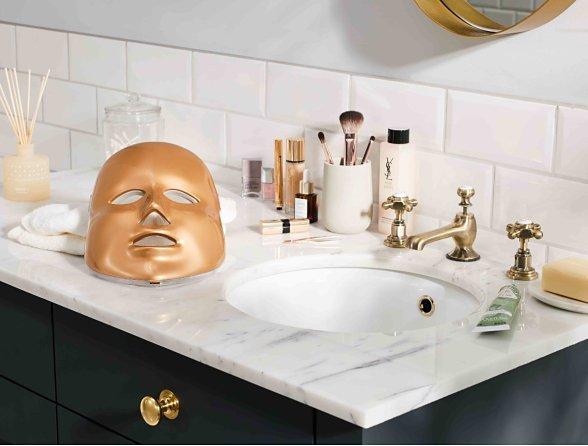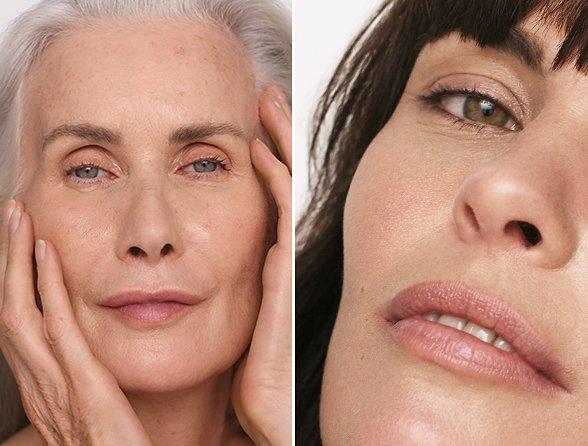The ABC of healthy-skin essentials
Confused about skincare? You’re not alone. We reveal the ingredients you really need to build a beauty capsule wardrobe, and discover healthy skin among all the acronyms, technical terms and buzzwords
So, what are the best skincare products – the ones that we actually need on a day-to-day basis? In clothing terms, a capsule wardrobe is an edit of key pieces that work with your body type, never go out of style and are suitable for all seasons and occasions. By the same token, it’s a good idea to curate a beauty capsule wardrobe of evergreen skincare essentials aimed at eliciting a year-long glow, while freeing up time in your routine and room in your bathroom cabinet. Of course, there’s always room for manoeuvre, but the following line-up is made up of the skincare products everyone can benefit from, according to Dr Catharine Denning, advanced aesthetics doctor and medical director at Clinic One Point Six. ‘This basic ABC of skincare is my comprehensive daily routine recommendation for general skin health and can be adjusted for age and skincare conditions.’
A is for vitamin A (also known as retinoic acid)
‘A gold standard in anti-ageing, everyone can benefit from introducing a retinol into their regimen. Its strength ranges from retin-A (prescription only) to retinol (found in a variety of skincare products) and is particularly great for acne sufferers who benefit from higher strength formulations. Results improve with increased strength but this can be at the cost of increased irritation so always build up tolerance slowly and, if your skin is particularly sensitive, bakuchiol is a great natural, less irritating, alternative. Apply first thing after you cleanse at night and build up tolerance slowly.’
B is for vitamin B
‘Vitamin B is an antioxidant that helps to treat signs of ageing and alleviate sensitive skin. Both vitamin B3 (niacinamide) and vitamin B5 (pantothenic acid) are suitable for all skin types. Vitamin B3 is especially beneficial for sensitive and acne-prone skin, while vitamin B5 is useful for normal to dry skin types, especially if it’s formulated with hyaluronic acid.’
C is for vitamin C
‘This powerful antioxidant has been proven to protect your skin synergistically with SPF use. A product containing vitamin C in the form of stabilised L-ascorbic acid (between 10-20%) is also a go-to for skin health and brightening as it is great for anti-ageing, pigmentation and general skin radiance. Use first thing in the morning after cleansing, but use with caution on acne-prone skin as it can inflame blemishes.’
D is for defence
‘Specifically make sure you defend against UV radiation with sunscreen. Apply a sunscreen every day (including throughout the winter months) that is separate to makeup and moisturiser and reapply every few hours where possible. Look for a sunscreen that protects against UVB (minimum factor SPF30) and UVA (5-star rating). I personally prefer titanium dioxide and zinc oxide formulations but they don’t always suit dark skin, in which case using a chemical filter is just as good.’
E is for exfoliators
‘Using gentle acids daily, such as glycolic (for oilier skin) or lactic (for drier skin) will help to keep skin looking healthy and radiant and will ensure that the skincare products you put on top are able to absorb better. Build up tolerance to exfoliation slowly and super-charge with in-clinic acid peels. If your skin is particularly congested or acneic, combine with a salicylic acid. Some people may find that a face wash containing acids is enough to elicit a glow, but most will benefit from a dedicated acid-based serum.’
F is for face wash
‘Cleansing your face twice a day with a face wash (not soap or wipes, which can disrupt the skin’s hydro lipid barrier) is paramount to a healthy complexion. I favour double cleansing at night with a micellar water followed by your normal cleanser and tend not to advocate scrubs as these are often too abrasive for some skin types and can cause micro tears. Dry, sensitive, or older skin types should avoid foaming cleaners and use hydrating creamy cleansers that are fragrance, soap and alcohol free, while oily or blemish-prone skin will benefit from cleansers with gentle exfoliating acids such as lactic or glycolic acid. If your skin is acne-prone, a face wash containing salicylic and/or malic acid can also be great to help clear congestion.’




